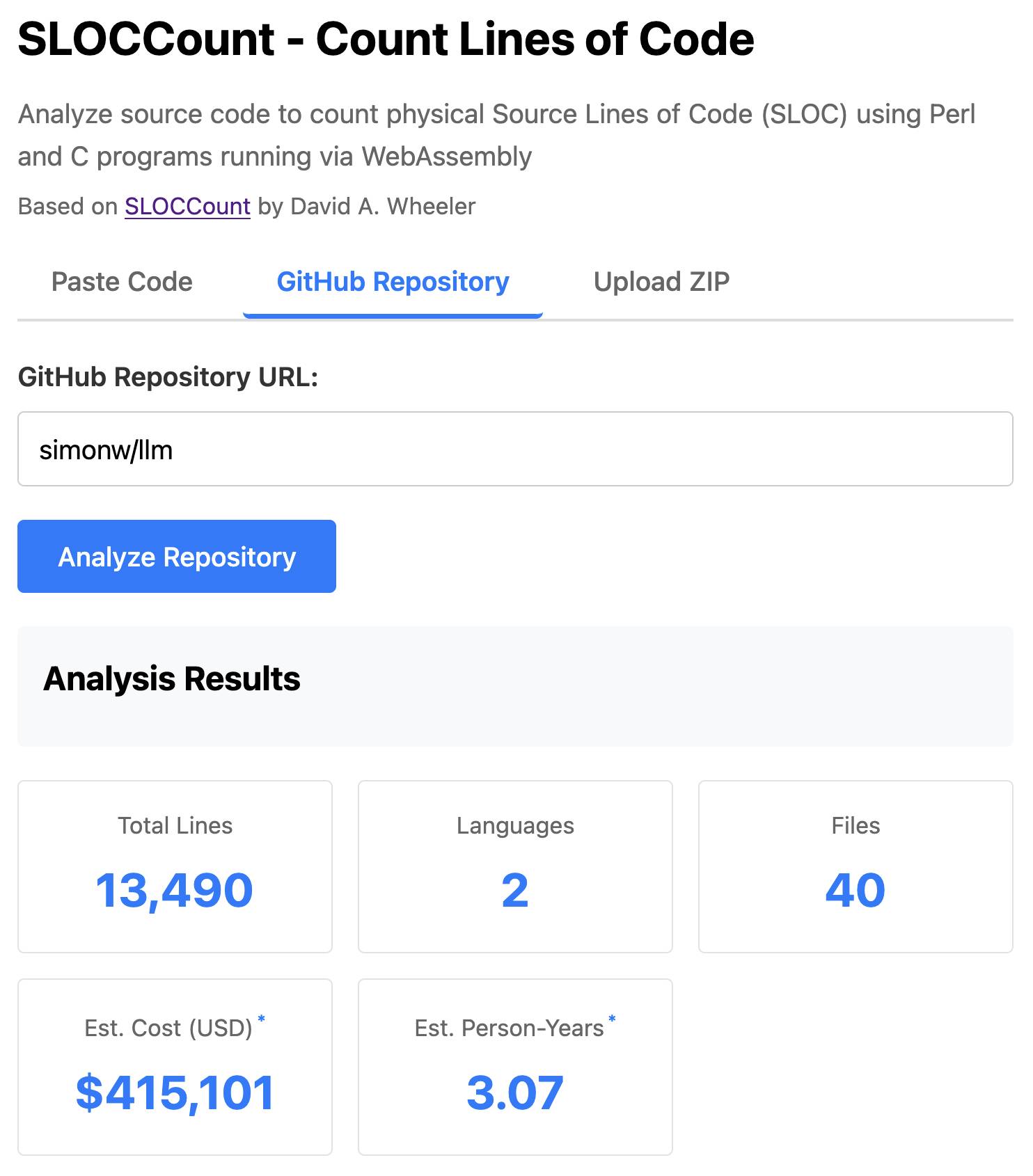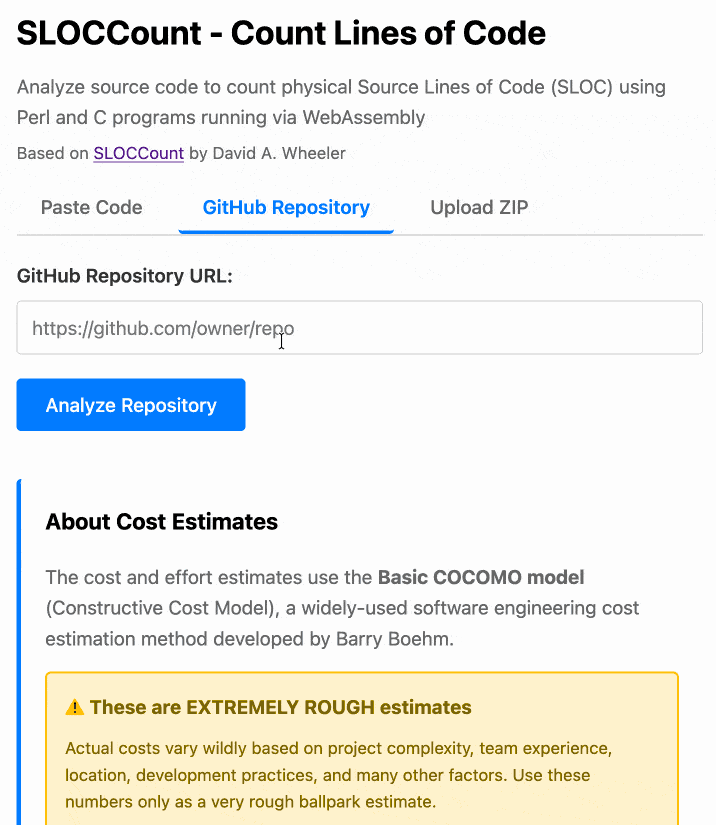29 posts tagged “perl”
2026
It’s also reasonable for people who entered technology in the last couple of decades because it was good job, or because they enjoyed coding to look at this moment with a real feeling of loss. That feeling of loss though can be hard to understand emotionally for people my age who entered tech because we were addicted to feeling of agency it gave us. The web was objectively awful as a technology, and genuinely amazing, and nobody got into it because programming in Perl was somehow aesthetically delightful.
— Kellan Elliott-McCrea, Code has always been the easy part
2025
SLOCCount in WebAssembly. This project/side-quest got a little bit out of hand.

I remembered an old tool called SLOCCount which could count lines of code and produce an estimate for how much they would cost to develop. I thought it would be fun to play around with it again, especially given how cheap it is to generate code using LLMs these days.
Here's the homepage for SLOCCount by David A. Wheeler. It dates back to 2001!
I figured it might be fun to try and get it running on the web. Surely someone had compiled Perl to WebAssembly...?
WebPerl by Hauke Dämpfling is exactly that, even adding a neat <script type="text/perl"> tag.
I told Claude Code for web on my iPhone to figure it out and build something, giving it some hints from my initial research:
Build sloccount.html - a mobile friendly UI for running the Perl sloccount tool against pasted code or against a GitHub repository that is provided in a form field
It works using the webperl webassembly build of Perl, plus it loads Perl code from this exact commit of this GitHub repository https://github.com/licquia/sloccount/tree/7220ff627334a8f646617fe0fa542d401fb5287e - I guess via the GitHub API, maybe using the https://github.com/licquia/sloccount/archive/7220ff627334a8f646617fe0fa542d401fb5287e.zip URL if that works via CORS
Test it with playwright Python - don’t edit any file other than sloccount.html and a tests/test_sloccount.py file
Since I was working on my phone I didn't review the results at all. It seemed to work so I deployed it to static hosting... and then when I went to look at it properly later on found that Claude had given up, cheated and reimplemented it in JavaScript instead!
So I switched to Claude Code on my laptop where I have more control and coached Claude through implementing the project for real. This took way longer than the project deserved - probably a solid hour of my active time, spread out across the morning.
I've shared some of the transcripts - one, two, and three - as terminal sessions rendered to HTML using my rtf-to-html tool.
At one point I realized that the original SLOCCount project wasn't even entirely Perl as I had assumed, it included several C utilities! So I had Claude Code figure out how to compile those to WebAssembly (it used Emscripten) and incorporate those into the project (with notes on what it did.)
The end result (source code here) is actually pretty cool. It's a web UI with three tabs - one for pasting in code, a second for loading code from a GitHub repository and a third that lets you open a Zip file full of code that you want to analyze. Here's an animated demo:

The cost estimates it produces are of very little value. By default it uses the original method from 2001. You can also twiddle the factors - bumping up the expected US software engineer's annual salary from its 2000 estimate of $56,286 is a good start!
I had ChatGPT take a guess at what those figures should be for today and included those in the tool, with a very prominent warning not to trust them in the slightest.
2024
Things I’ve Learned Serving on the Board of The Perl Foundation (via) My post about the PSF board inspired Perl Foundation secretary Makoto Nozaki to publish similar notes about how TPF (also known since 2019 as TPRF, for The Perl and Raku Foundation) operates.
Seeing this level of explanation about other open source foundations is fascinating. I’d love to see more of these.
Along those lines, I found the 2024 Financial Report from the Zig foundation really interesting too.
2017
Object models (via) Extremely comprehensive and readable discussion of the object models of Python, JavaScript, Lua and Perl 5. I learned something new about every one of those languages.
2010
LWPx::ParanoidAgent. Every programming language needs an equivalent of this library—a robust, secure way to make HTTP requests against URLs from untrusted sources without risk of tarpits, internal network access, socket starvation, weird server errors, or other nastiness.
2009
Perl: Love it, or hate it, but don’t ignore it. Phillip Smith calls me out for omitting Perl from my list of Node.js event loop alternatives (I only mentioned Twisted and EventMachine). No conspiracy here, I’m just not connected enough to the Perl community to know what the popular event loop libraries are. To Perl’s credit, Perlbal was the first piece of software I saw that showed me how a single threaded, event loop based system could massively outperform a threaded alternative.
memcache-top. Useful self-contained perl script for interactively monitoring a group of memcached servers.
Perl 6: The MAIN sub (via) "Calling subs and running a typical Unix program from the command line is visually very similar: you can have positional, optional and named arguments." - that's exactly what I was thinking when I came up with optfunc.
aws—simple access to Amazon EC2 and S3. The best command line client I’ve found for EC2 and S3. “aws put --progress my-bucket-name/large-file.tar.gz large-file.tar.gz” is particularly useful for uploading large files to S3. Written in Perl (with no dependencies), shelling out to curl to do the heavy lifting.
2008
Sam Vilain converted Perl's history from Perforce to Git. [..] He spent more than a year building custom tools to transform 21 years of Perl history into the first ever unified repository of every single change to Perl. In addition to changes from Perforce, Sam patched together a comprehensive view of Perl's history incorporating publicly available snapshot releases, changes from historical mailing list archives and patch sets recovered from the hard drives of previous Perl release engineers.
Spicing Up Embedded JavaScript. John Resig collects the various ways in which a JavaScript interpreter can be hosted by Python, PHP, Perl, Ruby and Java. There are full JS implementations in PHP, Perl and Java; Ruby and Python both have modules that use an embedded SpiderMonkey.
The Perl community has a long-standing love/hate-affair with making changes that impose "spooky action at a distance". They call it "black magic" and it is generally considered it a last resort. Black Magic that makes GLOBAL changes to things like inheritance is often characterised as being "Octarine" (see disk world novels), because it tends to work ok when there's only one person doing it, but start to mix a few together and KABOOM!
Naming twins in Python and Perl. Simple anagram problem solved in Perl and Python, with a bunch more solutions in the comments. The C# solution provides an interesting example of LINQ in action.
2007
The future of web standards. Nice analysis from James Bennett, who suggests that successful open source projects (Linux, Python, Perl etc) could be used as the model for a more effective standards process, and points out that Ian Hickson is something of a BDFL for the WHAT-WG.
Perl on Rails—Why the BBC Fails at the Internet. Depressing explanation of how the BBC’s decision to outsource its technical infrastructure to Siemens has resulted in severe technology limitations, including the need for everything to run on Perl 5.6 (5.8 came out in 2002).
BBC Radio Labs: Perl on Rails. BBC engineered built their own Rails clone in Perl to fit in with the BBC’s engineering infrastructure—it’s already running the new programmes guide.
wikimarkup (via) “MediaWiki markup in Python”. I’ve always suspected that MediaWiki was like Perl; the only thing that can parse MediaWiki is MediaWiki. Not sure how faithful this Python port is but I’d love my theory to be proved wrong.
lwqueue. Lightweight cross-language message queue system, written in Perl with client libraries in Perl, Python and Ruby.
Mac OS X Leopard: UNIX. Leopard ships with DTrace, and it’s been hooked in to Java, Ruby, Python and Perl.
JavaScript Minifier that doesn’t break code (via) Perl re-implementation of Douglas Crockford’s classic JSMin that doesn’t clobber IE’s conditional comments, by Peter Michaux.
’tie’ considered harmful (via) Rich Skrenta on the disadvantages of abstractions like Perl’s tie, which lets you create hash data structures that aren’t actually hashes. Operator overloading (as seen in Python) suffers the same problems.
Primality regex. A regular expression that can identify prime numbers. Unsurprisingly, this one comes from the Perl community.
Data::ObjectDriver. Benjamin Trott’s Perl ORM, with built in support for both caching and data partitioning. I think this is what Six Apart uses for Vox.
2004
WWW::Odeon (via) A simple API for screen-scraping the www.odeon.co.uk website.
2003
Discovering Berkeley DB
I’m working on a project at the moment which involves exporting a whole bunch of data out of an existing system. The system is written in Perl and uses Berkeley DB files for most of its storage.
[... 339 words]Perl Slurp-Eaze (via) I once saw an expensive CMS self destruct after $/ was redefined
Code personalities
Danny O’Brien compares Perl with Python. Best observation: Python code just doesn’t have much personality compared to Perl.
Clearout
- Tristan Louis’ RSS to Necho convertor puts paid to the idea that the success of one format will be detrimental to the usefulness of the other.
- O’Reilly’s RegExp Power series (part one and part two) demonstrate some powerful tricks for use with Perl compatible regular expressions.
- Norman Walsh explains Content Negotiation and some of the pitfalls with modern browser implementations.
- So that’s what happened to Digitiser. See also a Digitiser Tribute and a Mr Biffo interview from 2001 for background information. I cuss you bad.
- George Orwell: Politics and the English Language
- Clay Shirky: A Group Is Its Own Worst Enemy. The title is misguiding; this is an essay about how online groups behave and how to look after them.
- A Java HttpClient Class.
- Some good stuff on Boxes and Arrows: Ten Quotable Moments: Challenges and Responses for UI Designers and Views and Forms: Principles of Task Flow for Web Applications (Part 1).
- Inside our notions of “document” and Inside our documents II—the Runoff model.
- 5 days worth of XSLT observations from Simon St. Laurent: One, Two, Three, Four, Five.
- Windows programming with open source tools: Minimalist GNU For Windows and Win32 Programming with GNU C and C++.
Vector search engines
Building a Vector Space Search Engine in Perl by Maciej Cegłowski:
[... 307 words]